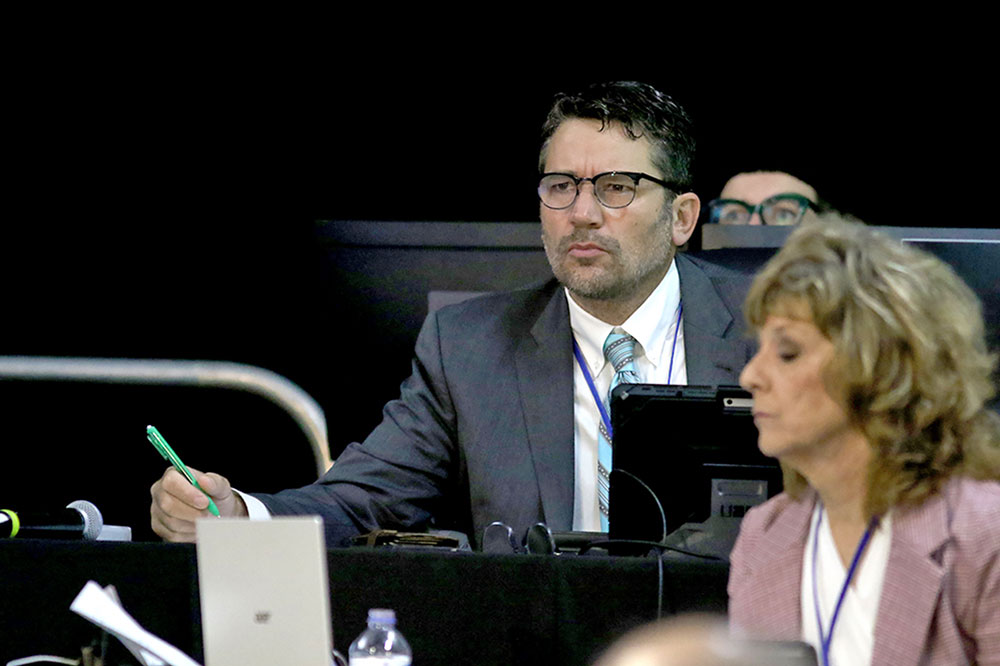Judge upholds his decision that allowed McQuillen Place sale; appeals are promised

By Bob Steenson, bsteenson@charlescitypress.com
A U.S. bankruptcy court judge in Iowa has ruled he will not change his previous decision that approved the sale of the McQuillen Place project in downtown Charles City to a new company.
In a two-sentence order issued Friday, Chief Judge Thad Collins denied two motions to reconsider his earlier order approving the sale, denied a motion to put a halt to action on his earlier order, and denied a motion to remove a part of the case dealing with copyright law out of the bankruptcy court.
Both of the parties that had been overruled in the decision said they would quickly appeal the order up the chain in the U.S. District Court system, an action that could potentially add a year or more to a final resolution for the unfinished three-story building on Main Street.
Collins had ruled on April 9 that the bankruptcy trustee in the McQuillen Place Co. LLC bankruptcy case could sell the unfinished building to First Security Bank & Trust, which has been the high bidder and which held the construction loan note on the project.
First Security transferred its right-to-purchase to a new company formed by the holding company that owns the bank. That new company, called Four Keys LLC, purchased the building and property for $1.1 million on April 24.
Just before the sale took place, however, the former equity owners of McQuillen Place Co. and the architectural company had filed the motions for reconsideration, for a stay on the sale, and regarding the bankruptcy issue.
The judge’s ruling Friday denied all those motions.
Kurt Herbrechtsmeyer, president and CEO of First Security Bank, said Monday he was glad the judge had ruled in their favor.
“Obviously we’re happy that we’re taking one more small step toward resolution – toward getting the building done,” he told the Press.
When asked about potential delays because of appeals, he acknowledged that could happen.
“We’re going to try to pursue something that might resolve that a little more quickly. It’s still our goal to get this in the hands of a developer as quickly as possible – hopefully yet this year and see this building get finished,” Herbrechtsmeyer said.
“Holding a building hostage until it gets through the court system isn’t going to be good for anybody, especially that building,” he said. “Our goal would still be to try to get something worked out or get something done through the courts more quickly than a couple of years. We’ll see what we can come up with.”
Judge Collins had indicated at the end of a hearing on the motions that was held May 8 that he was leaning in the direction of the decision he filed Friday, in part to let the U.S. District Court decide questions of copyright regarding the design and use of the combined residential and commercial building.
Attorney Louis Bonham of Houston, Texas, represents Cornice & Rose International, a Chicago-area architectural and construction company that designed the McQuillen Place building and oversaw much of the construction that has taken place.
Bonham had argued in the hearing May 8 that Cornice & Rose held the copyright on the design of the building that included the building itself and any use of the building, and there was no valid license to that copyright that the bankruptcy court could legally assign.
“We are disappointed the court disregarded well-established principles of federal law, and Cornice & Rose will be appealing this decision,” Bonham told the Press Monday.
“We are confident that on appeal the order will be overruled and thereafter all involved in any infringement of Cornice & Rose’s copyrights will suffer the consequences,” he said.
Bonham said the judge’s decision would be appealed either to the bankruptcy appeals panel or to U.S. District Court.
Charles Thomson, a Charles City attorney and the chief original developer of the McQuillen Place project, had filed motions on his own behalf and on behalf of James Gray, president and owner of Cornice & Rose, as the two security equity interest holders in the project.
Reacting to the judge’s decision, Thomson told the Press Monday, “I was disappointed with the court’s ruling and I plan to appeal. … In my view – and I believe federal law supports me fully on this – a bankruptcy court can no more authorize violations of the copyright statute than it can authorize other violations of federal law.”
He said he was most disappointed that “First Security’s foolhardy action in this will likely delay completion of McQuillen Place by at least another year.”
“First Security now has formal title to a building that it cannot complete, sell or rent, because anyone who touches it runs the risk of being sued for copyright infringement,” Thomson said.
“I was also appalled that the city of Charles City has decided to take the bank’s side on this,” he said. “The city really ought to try to remain neutral in construction and loan litigation among private parties. However, even conceding for a second that they want to see the building completed as soon as possible, they’ve managed to shoot themselves in the foot by siding with an idea that will delay completion indefinitely.
“It was ironic that this all happened on May 15,” Thomson said, referring to the anniversary of the 1968 tornado that destroyed much of Charles City’s downtown. “Only this time the city itself created the mess we have on Main Street.”








Social Share